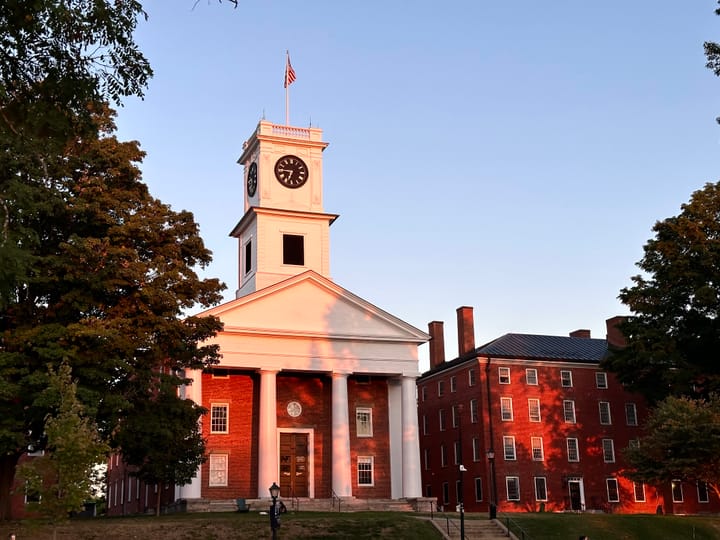Shea reports to faculty on financial liabilities
Shea began his presentation after President Tom Gerety prefaced it with statements regarding the heart of the “health care benefit question.” Gerety brought up issues of sustainability. “Is this a sensible set of benefits such that we can sustain them?” he said. Gerety stressed the importance of having realistic and sustainable benefits, while giving his reassurance that the Board of Trustees “expresses a sense that [faculty] compensation and [faculty] benefits ought to be generous and fair when evaluated in comparison to [comparative institutions].”
A committee formed last year has been investigating the health care benefits that the College offers to its employees and the financial liabilities that those benefits pose.
Following Gerety’s introduction, Shea spoke of the financial framework of the College, paying particular attention to the issues of financial and institutional equilibrium. Shea proceeded to explain the tenets of financial equilibrium and institutional equilibrium, foundations for the College’s financial planning.
According to Shea, financial equilibrium requires that operating budgets should be balanced, that they must be reasonably expected to remain in balance-achieved through the use of contingency funds among other things-that the purchasing power of the endowment be adequately maintained and that investment in facilities should be adequate to maintain their value. “In other words you can’t ignore your physical plant,” said Shea.
Shea cited regular maintenance and upkeep of academic and residential buildings, the comprehensive infrastructure upgrade and the residential master plan. “Some of the student housing has not been looked at in a very long time,” said Shea.
Institutional equilibrium, on the other hand, deals with maintaining and/or increasing the quality of faculty, staff and students of the College. Shea said that the College seeks to accomplish institutional equilibrium through salary increases, allocating additional funds for faculty research and senior sabbatical leaves, keeping the student body qualified and diverse and maintaining support of alumni. “I think that the College has done a very good job in moving from the 1992 period up until today,” said Shea.
Shea went on to discuss the generous general and post-retirement health care plan that the College currently offers as well as the proposed revisions that the health insurance committee and the Board of Trustees are looking at. “The level of our benefit is quite unusual and it was a place that we could look for some savings in the overall health care cost,” said Shea who added that the health care liabilities of the College are significant and rising.
Shea said that the Board was looking into elimination or capping of reimbursement for Medicare payments to retirees that are taken out of their pay while at the College, which he cited as “a very unusual benefit.” The switching of the reimbursement for Medicare after the death of the faculty member to their spouse is also under review, as well as whether or not the retiree should contribute to their insurance premiums (currently covered in full by the College for individual beneficiaries and 70 percent for families). To whom any of these changes would apply and to what degree is also still under discussion. The changes themselves are only in a discussion phase.
Some members of the faculty took issue with the possibility of decreasing post-retirement benefits. Professor of French and European Studies Ronald Rosbottom spoke to the “moral value” of certain figures. “[Employee benefits and physical plant concerns] don’t have equal moral value … the Physical Plant expenditures are not equal to financial aid expenditures in a moral sense, and other infrastructure expenditures-even the library … are not equal to personnel in a moral sense,” he said. “I think the financial framework should be revisited and we should remember what we’re about at this institution.”
Rosbottom’s sentiment was echoed by Professor of Physics Arthur Zajonc. “This is not a question of a simple market-based calculation,” said Zajonc. He agreed with Rosbottom that the people who put the benefits in place were thinking about moral value.
Professor of Philosophy Alexander George put a petition forth to the faculty regarding the possibility of the United States going to war against Iraq. George prefaced his petition by stating that the Committee of Six had decided that this item should not be voted on by the faculty and that he agreed with them.”A number of people were concerned that the subject was too distant [from the usual business of the faculty] and that it was inappropriate to bring up at the faculty meeting,” said George after the meeting had concluded. “The second issue at hand was that the faculty handbook says that anything that we vote on in meetings is binding … and while it’s one thing to be bound to an honor code, for example, a vote [on the war] would have constituted an infringement of political conscience,” said George.
Acting AAS President Bob Razavi read aloud a letter addressed to the faculty on behalf of Student Senator Maria Jones ’05. Jones, along with other members of the AAS and the Progressive Students Alliance, said that they decided that a walk-out today, coinciding with a larger nationwide movement, be inappropriate and would indicate an adversarial relationship with the College. In her letter, Jones appealed to the faculty to devote five or 10 minutes at the beginning or end of their classes to discuss the war.
Director of Information Technology Phil Fitz also made a short presentation at the beginning of the meeting. Fitz responded to concerns about the email system, updated the faculty on the current progress with the DataTel system and remarked on the visiting committee that the IT department will be bringing to the College on April 13-15. Members of the committee are chief IT officers from Swarthmore, Williams and Trinity Colleges. Their visit will be preceded by commercial consultants who will specifically review the “technical underpinnings of [our email system]” in a report which will go to the Dean of Faculty.





Comments ()